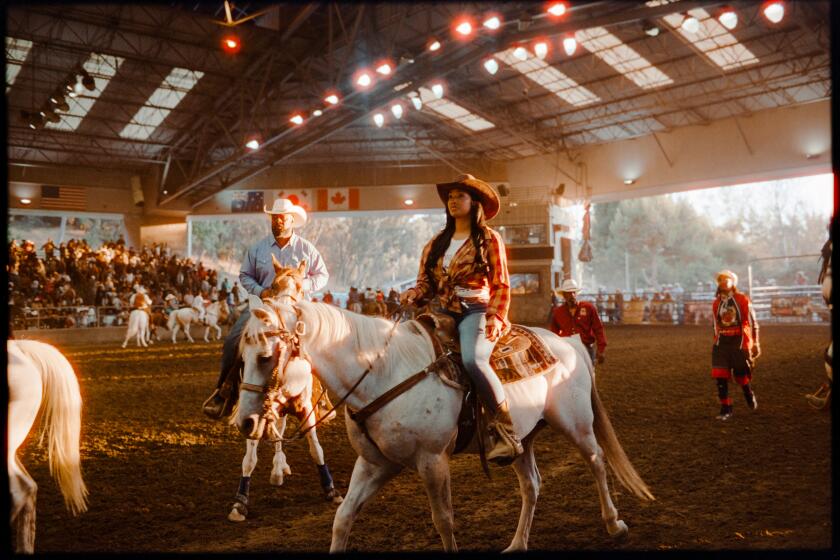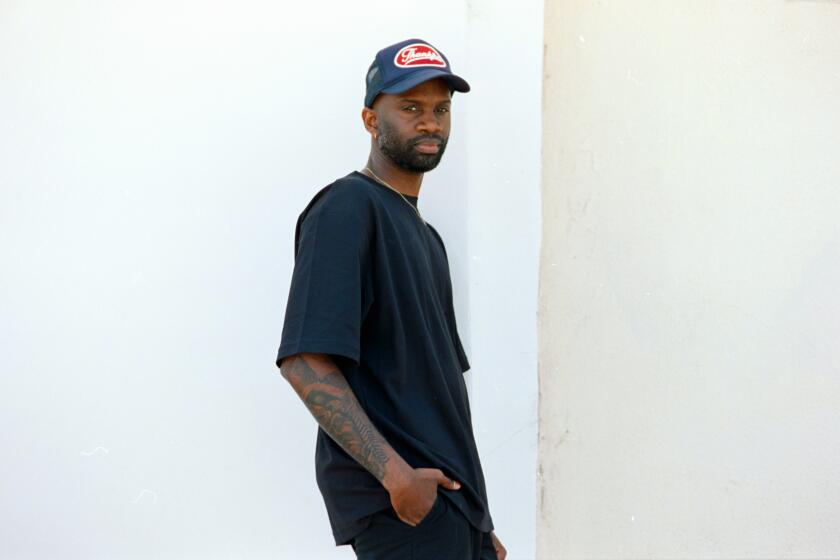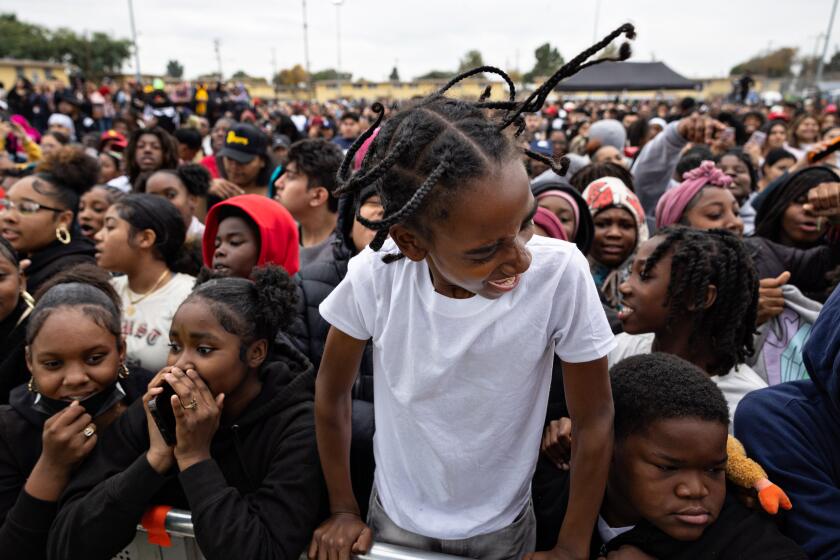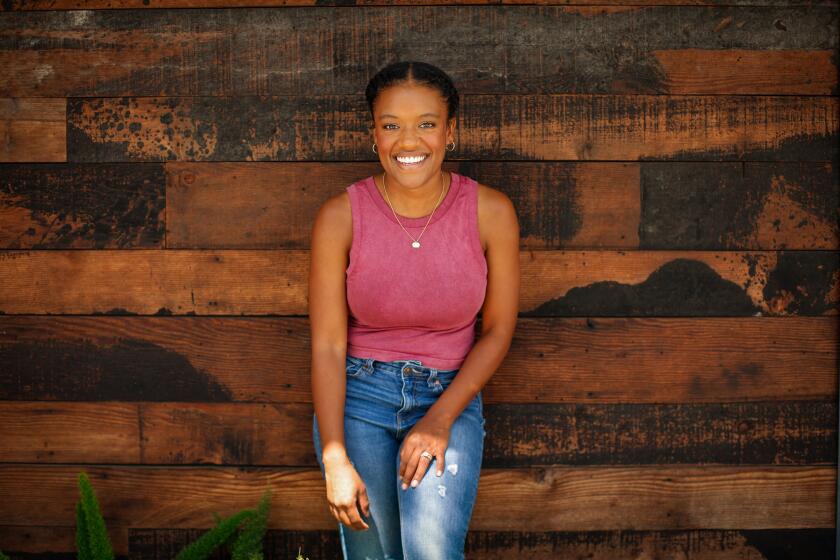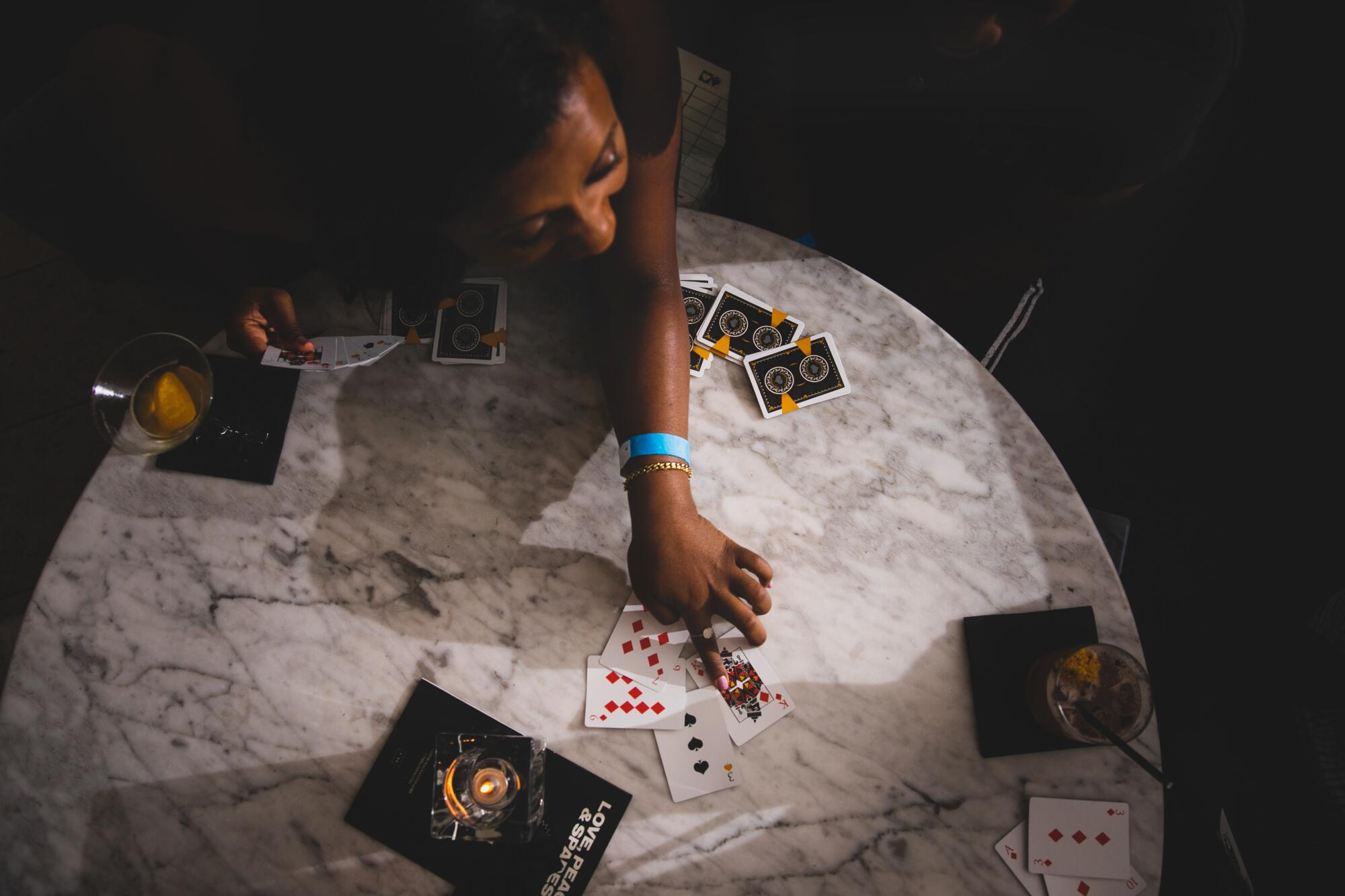
- Share via
It’s a brisk first Wednesday in June, and the Love, Peace & Spades festivities are just getting started at Koreatown luxury hotel the Line LA. In the lobby of the sumptuous 12-floor location on Wilshire Boulevard, DJ Ill Meca spins while special guest host and comedian Jonnae Thompson works the room. She calls out “Team Virgo” and “Team Cali,” while Kendrick Lamar’s “King Kunta” and De La Soul earworm “Me, Myself and I” thump from the speakers.
Booklets are carefully situated on tables, their pages giving a breakdown of spades terminology and game rules for those who need a refresher. A projector above a photo booth shows clips from classic Black films and Blaxploitation movies, along with candid photos of attendees. There’s banter and moderate arguing among guests, but it’s all in the name of socializing and play as the monthly mixer Love, Peace & Spades brings cultural exchange back to the card table.
Spades is having a renaissance in mainstream Black culture. Author, poet and cultural critic Hanif Abdurraqib poignantly wrote about its significance in a chapter of his 2021 book, “A Little Devil in America.” The recently canceled NBC sitcom “Grand Crew” has shown main characters playing the plain-trick game. A second-edition spades tournament was held at annual music festival Roots Picnic in Philadelphia, where a lineup of champions at the World Series of Spades was crowned. Now, Black America’s favorite pastime has a hub in L.A.
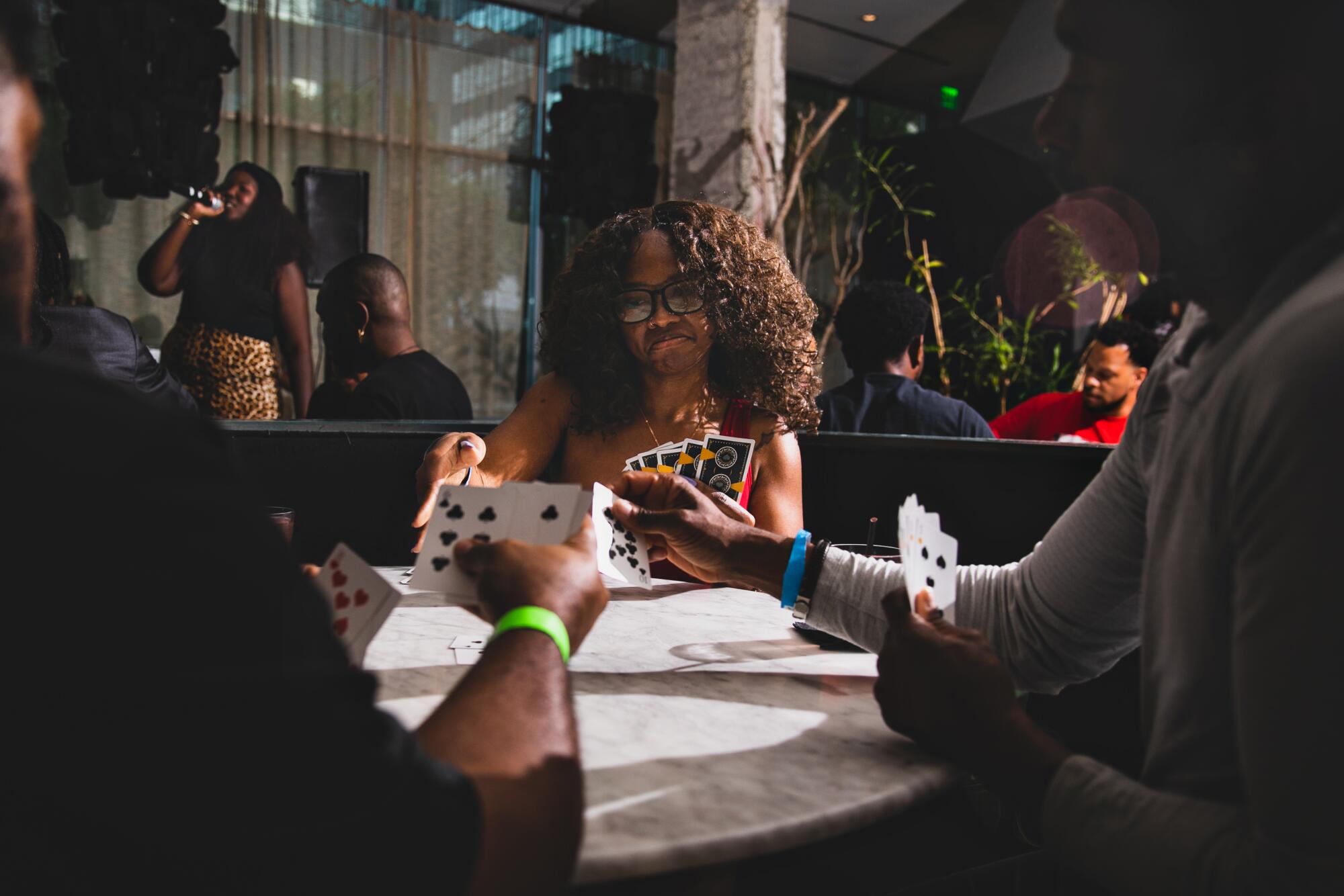
Starting a monthly game night wasn’t originally in the cards for Kevin L. Clark, the creator of Love, Peace & Spades. Born and raised in Akron, Ohio, Clark had spent 17 years living in New York, where he found his niche as a culture journalist and editor. Due to a life change at the onset of the pandemic, he relocated to L.A. in 2022, becoming director of communications for the Leimert Park Juneteenth Festival. Amidst the cross-country move, Clark longed for the coterie he’d established in the Midwest and East Coast, which he revitalized through his event, dubbed “a rather fly game night.”
“Over the course of my time in New York, I would always ask if people knew how to play and they’d always have some kind of weighted trauma. Something from their childhood or a way that people play gave them pause,” he said. “I just couldn’t find a community of people who would play. When I moved out here, it was kind of the same thing, but they had an element of a game night culture. People would host free game nights and I saw that as a potential in.”

Before LP&S was conceived, predominantly Black game nights were hosted at Clark’s alma mater, Kent State University, where students connected through playing spades at each other’s campus houses and cafeterias. Clark enjoyed the intimacy of the get-togethers but admits to having an aggressive game-play streak. In high school, he was called to the principal’s office for his involvement in an altercation after being accused of cheating in spades. Other card matches have been just as hostile, from tables being flipped over to participants being cursed out for reneging.
Looking to undo those weighty experiences, Clark collaborated with members of Leimert Park Rising, like Fred McNeill Jr., who assisted in placing LP&S at the Line. Although the committee first considered the Gathering Spot in West Adams as the event’s locale, the centrality and high-end atmosphere of the Line has helped to ensure its success. Since the inaugural LP&S gathering in December, it has welcomed a multicultural influx of entrepreneurs, creatives, artists and expressionists, many who return for spades and other classic Black family games such as Bid Whist, Tonk, dominoes and Uno.
Partially inspired by “How You Play Spades Is How You Play Life,” Gabrielle Ione Hickmon’s ethnographic look at the story of spades history within Black culture, LP&S offers donation-based play for intergenerational Black card game players to engage over deep-rooted traditions.
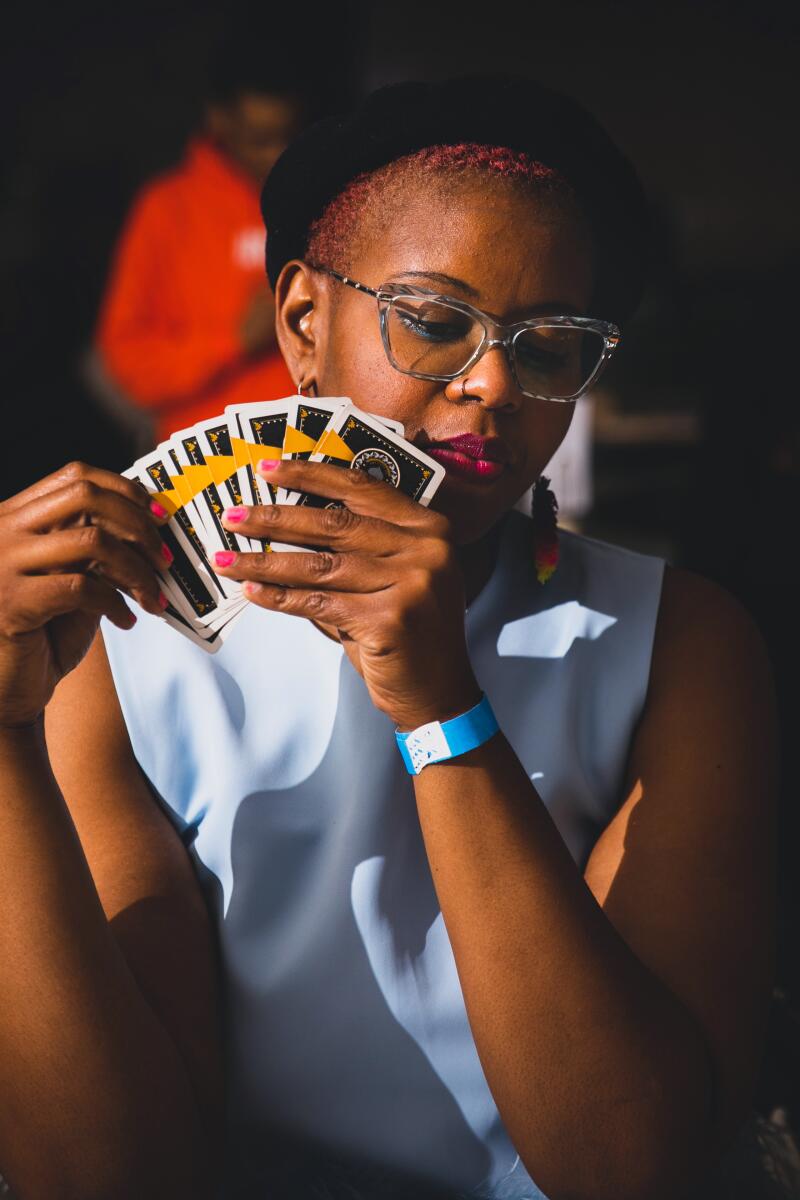
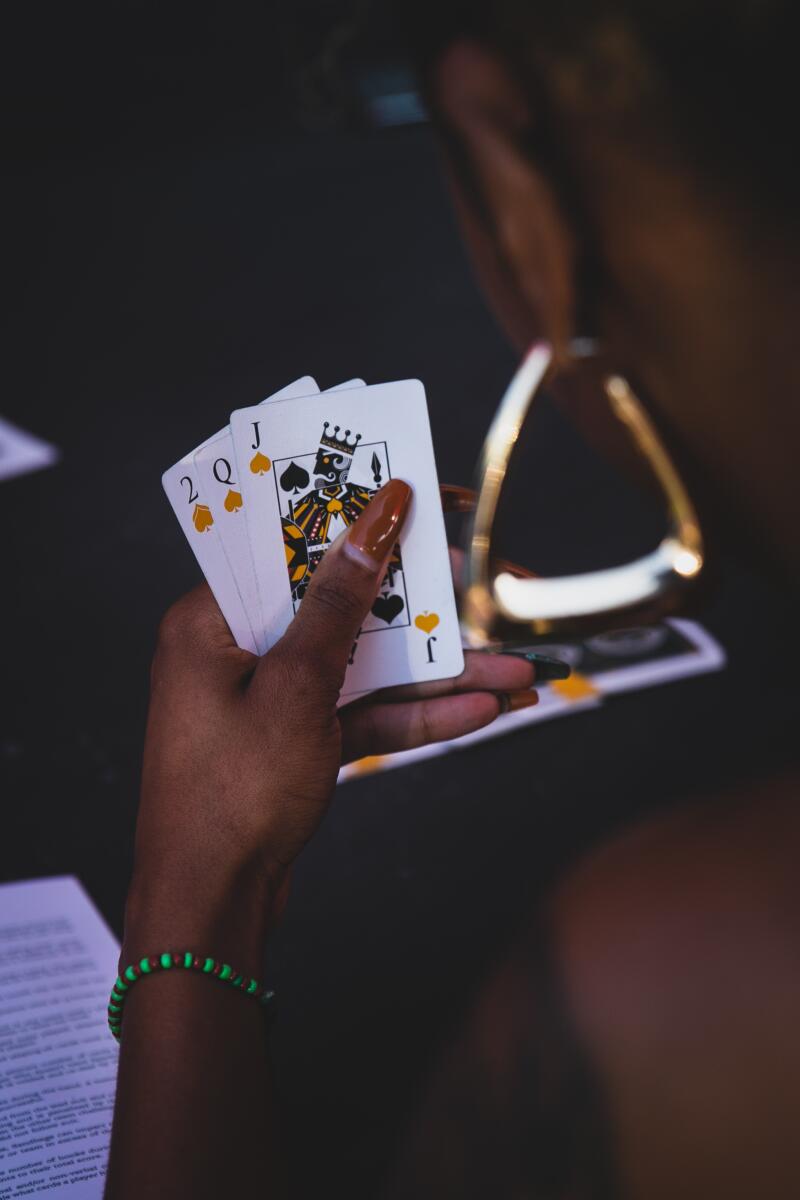
1. Aisha Gaten plays spades at the Line hotel as people gather for games and good conversation at Love, Peace & Spades on June 7, 2023. 2. Love, Peace & Spades is a safe and inclusive space for Black people to enjoy one another and play Uno, bid whist, Tunk, dominoes and spades. (Jason Armond / Los Angeles Times)
“They’re all rooted in the community and trying to address systemic issues that have affected the Black community for a century-plus,” Clark says about guests of the gathering, which is held through his creative consultant company Subject to Change. “In Leimert Park, specifically, is that central hub where people from all over in terms of the Black and brown community in Los Angeles come to kind of feel like a safe space innately, and we just kind of took those same elements and merged it into this game night.”
One element that LP&S organizers introduced for spades newcomers is the Spades School, available to both beginners and occasional players who want to refine their skills. Hosted throughout the night at 30-minute intervals, each session has coaches who teach spades and course-correct from emotional traumas associated with the game’s competitive nature.
Clark, who’d been resistant to throwing live events, became amenable to arranging LP&S with a group outside of his work in culture and entertainment. For Spades School, he tapped individual coaches, like Bolivia, N.C., transplant Isiah Williams, who frequently played spades with fellow crew members upon joining the Navy at 18. Hailing from Chicago, bicoastal independent filmmaker Eliyannah Yisrael acts as LP&S’ lead project manager; her background in production aided the team’s event curation. Also from Chicago, journalist, editor and cultural critic Jamilah Lemieux was named featured event host for her skills as an orator. L.A.-raised rapper Camille “iLL Camille” Davis’ is an artist, community organizer and director of business for En Homage. Her upbringing and decades-long musicality led to her assuming the titles of creative lead and director of business development. The group makes card games communal and inclusive on the first Wednesday of every month, with healing as their emphasis.
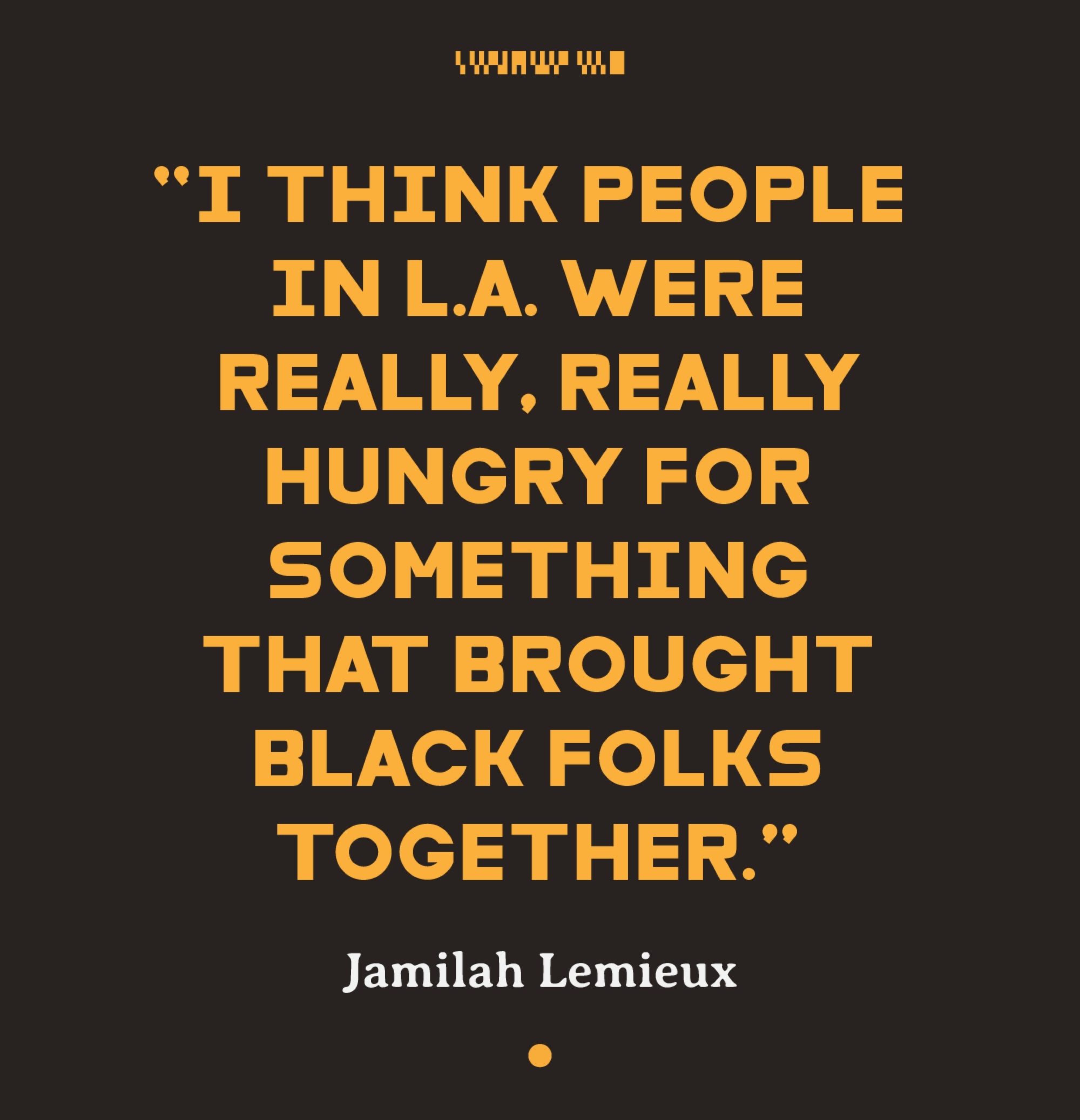
Toward the back of the Line hotel are two tables designated for Spades School. There, Williams, who joined LP&S through his friend Lemieux, encourages beginners to “play smart,” specifying which suits have a likelihood of being played first and the overall hierarchy system of the cards.
“I think we all know the stigma of newbies playing with more experienced players, whether they’d be family members or friends. It’s kind of like this daunting feeling to ask somebody to teach you because nobody’s patient enough to do it,” Williams says.
Coaches are attentive to whether attendees are passive or aggressive players, supporting them to lean into their strengths. Some already come to the table as experts, like Detroit native Leonard Thomas, who has lived in L.A. since 2018. A frequent LP&S attendee, Thomas originally played chess tournaments as a child before moving on to card games, which he says keeps him attentive.
“When I’m reading a lot of science research papers, they talk about just the importance of community and relationships to both health and longevity and life. I think having a monthly spades event, you have something that you can look forward to,” he says. “Because you have to think or observe people and make sure you’re playing your hand appropriately, it is still keeping you sharp or on your game.”
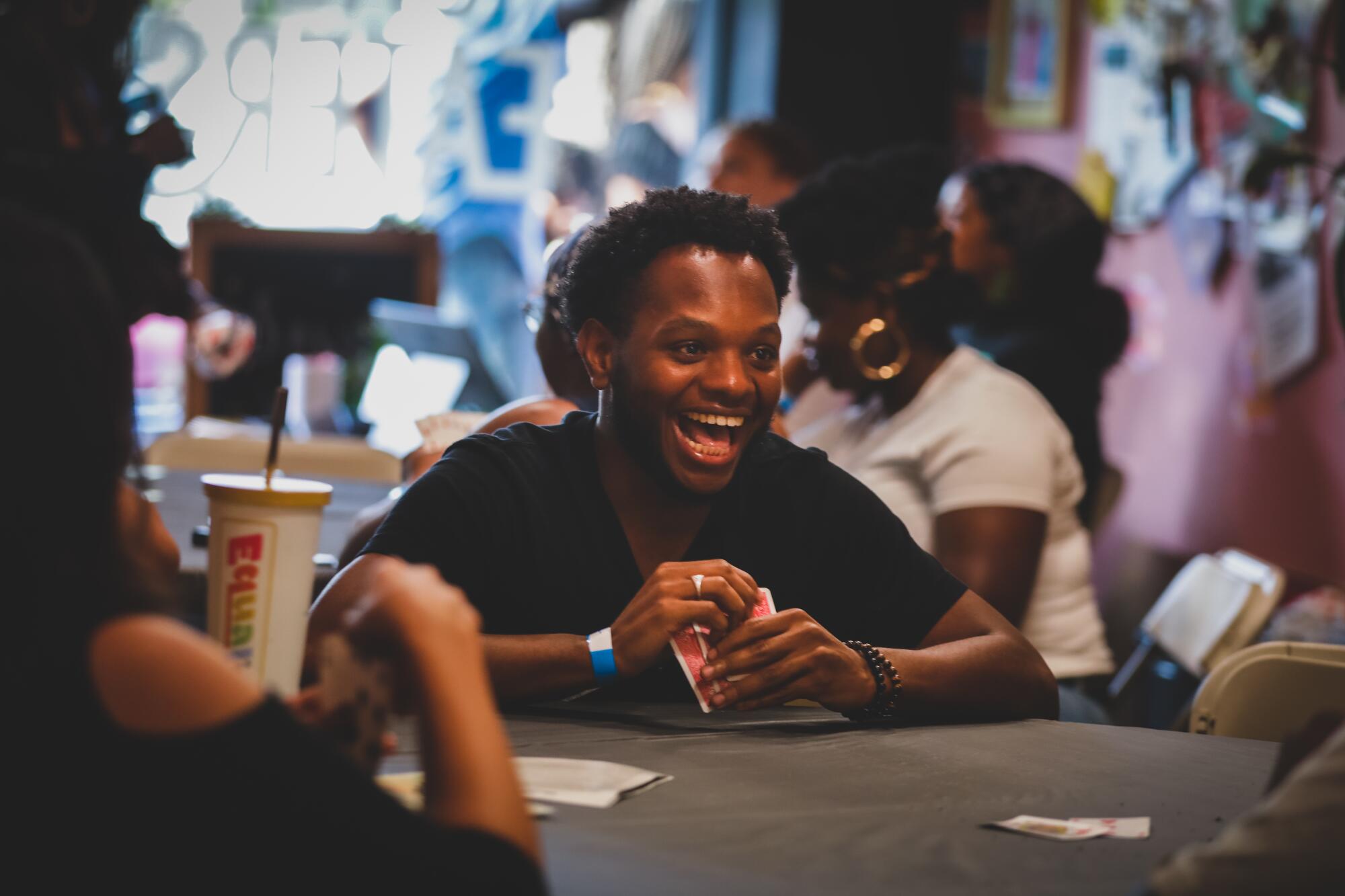
But some, whether they start at the beginners table or jump head-first into a round of spades, aren’t as advanced. Tashana Scott, a creator marketing lead at Instagram, went to LP&S in April and was partnered with a woman who seemed to be a spades novice. “I was like, you’re not bidding your hand correctly, and it just made it feel so unfair. Then the game was shorter so you didn’t get to beat them back,” Scott says. “But one thing they do is get feedback from the community and they try a different way the next month to see if that helps everyone [be] less crazy about the game.”

Along with post-event follow-ups, LP&S maintains its vibe through DJ sets. Davis, who released the full-length solo album “Heirloom” in 2017, says, “We hope that you damn near want to get up and dance, and people do. Or if you want to sit there, you can still keep it real player and just enjoy yourself — you can still have a conversation. It’s not blaring but it’s definitely a two-step appropriate volume. You should definitely feel welcomed, but it all starts in the music as soon as you hit the lobby.”
Black L.A. residents have long searched for casual-sportive places to commune, even connecting strangers who otherwise wouldn’t have had a chance to interact.
“As Black people in this country, one of the things that we have created space for with each other is this game,” says Yisrael. “This place to be as loud as we want to be, as expressive as we want to be, it’s a place where we can be aggressive — we can really, really allow ourselves to be open and be free. It’s giving people a chance to have a place that they come to once a month and it’s like being with family immediately.”
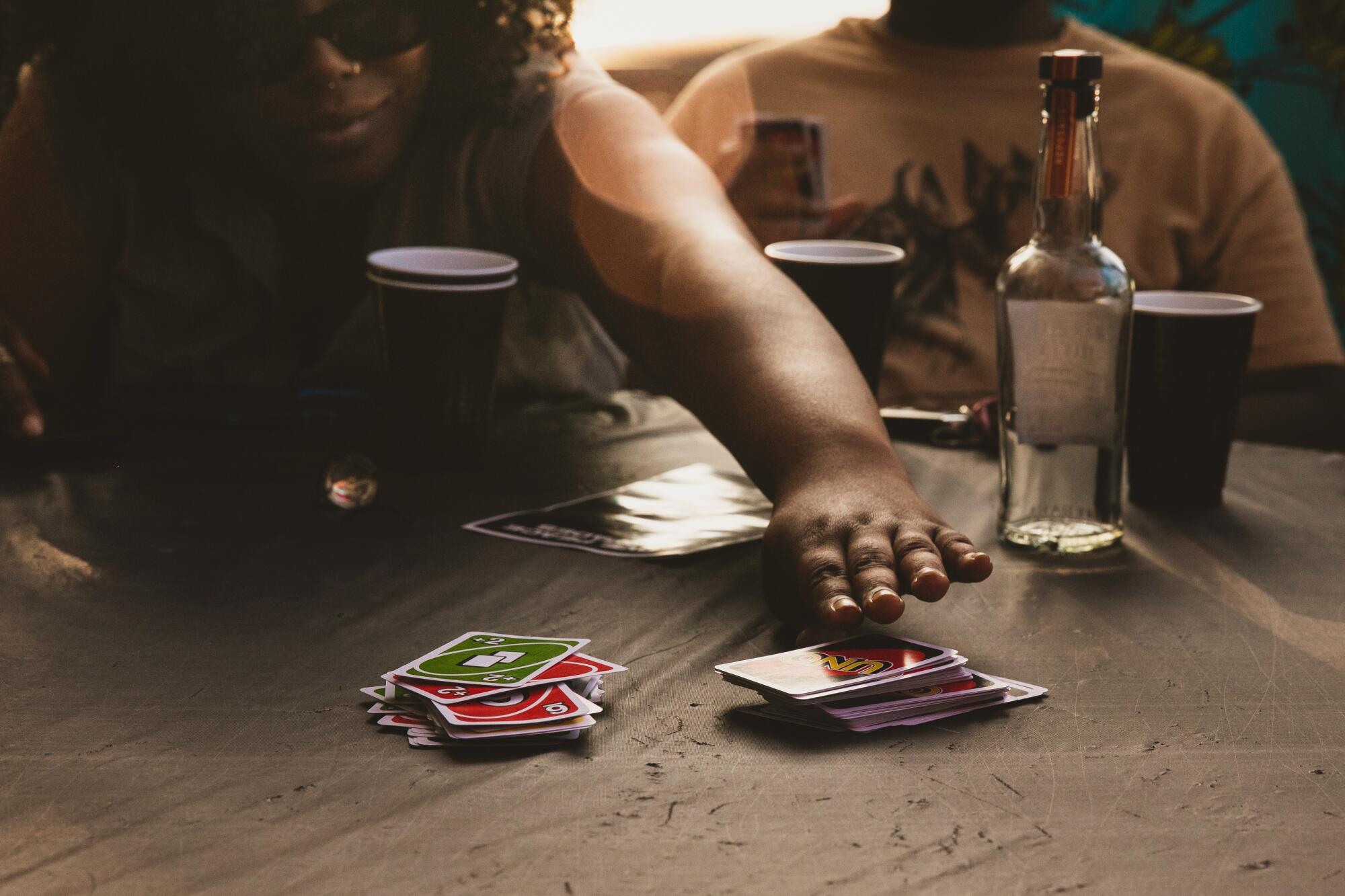
“Black people here want Black spaces, they want to be around other Black people,” says Lemieux. “They want to meet, they want to have fun, they want to let loose. There hasn’t been a Love, Peace & Spades that wasn’t full. I think people in L.A. were really, really hungry for something that brought Black folks together.”
The future of LP&S is multifaceted. Already technologically savvy through QR codes on flyer graphics and day-of event scheduling via Microsoft Teams, there’s hopes to intersect gameplay and the metaverse in collaboration with Black digital creators. With past sponsors including the South L.A. Wine Club (who once offered its drinks during LP&S’ Black Women’s History Month event), possibilities to team with other Black-owned companies are infinite. Reconnecting Black L.A., LP&S gives visibility to underrepresented people within a joyful environment that feels like home.
“We talk about a lot of things now: rest as resistance, the need for self-care, the need for therapy and mental health advocacy,” Clark says. “But what this night shows both in L.A. and, hopefully, the rest of the Black community is that we need spaces to have fun and play and not have to worry about what has affected us, or what continues to affect us outside.”
More to Read
The biggest entertainment stories
Get our big stories about Hollywood, film, television, music, arts, culture and more right in your inbox as soon as they publish.
You may occasionally receive promotional content from the Los Angeles Times.




